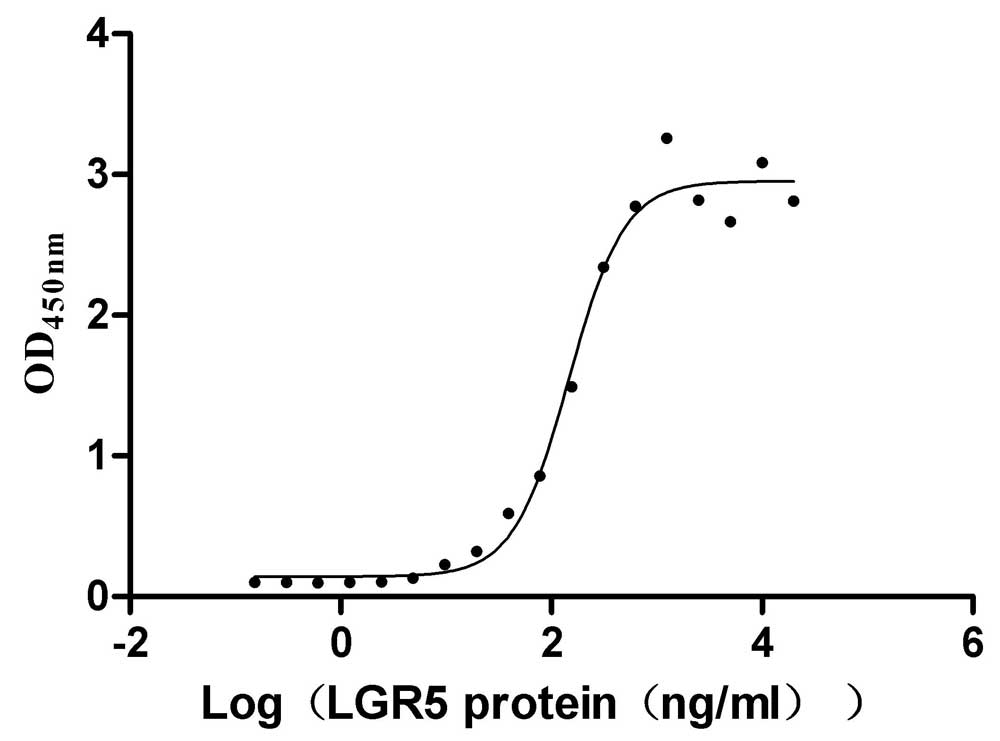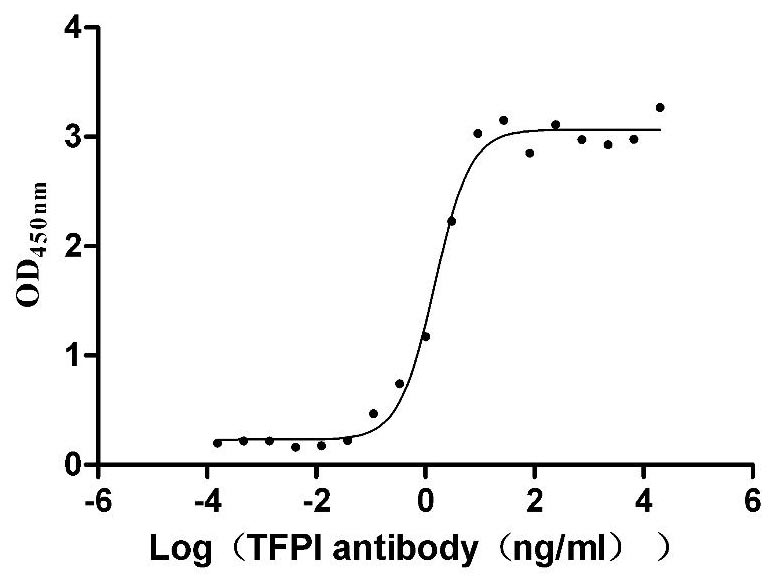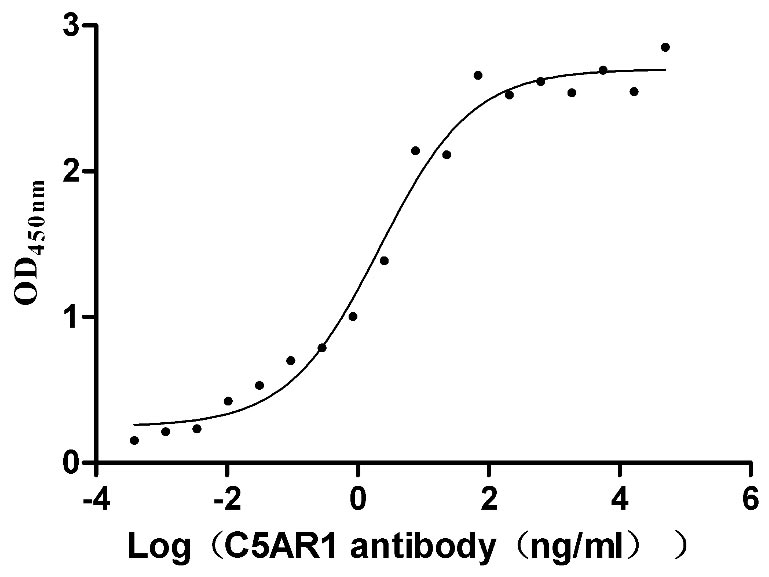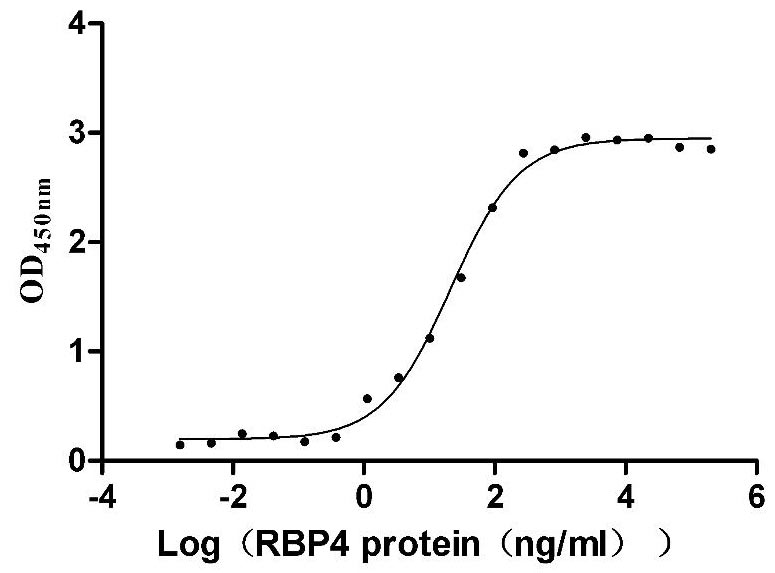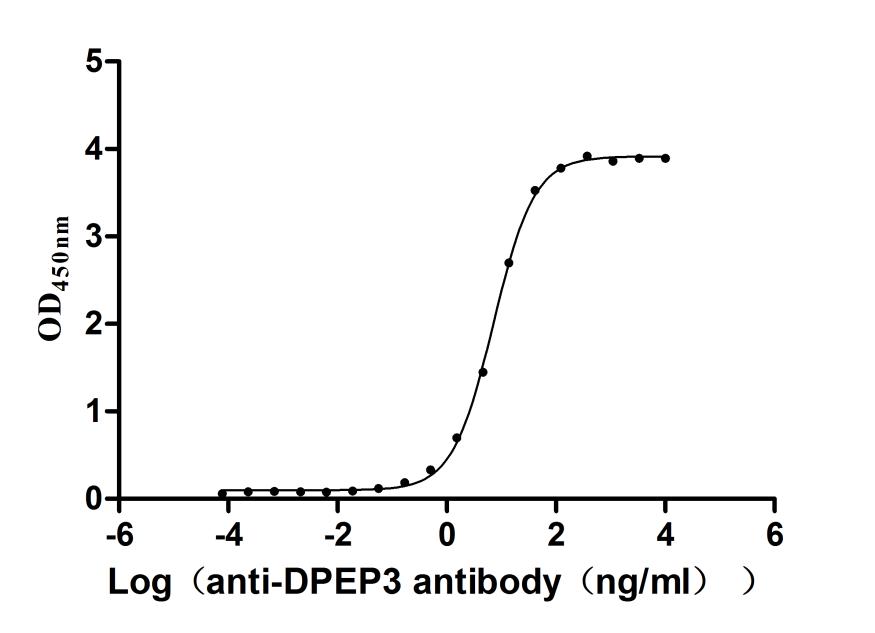Recombinant Human T-cell leukemia/lymphoma protein 1A (TCL1A)
-
中文名称:人TCL1A重组蛋白
-
货号:CSB-YP023313HU
-
规格:
-
来源:Yeast
-
其他:
-
中文名称:人TCL1A重组蛋白
-
货号:CSB-EP023313HU
-
规格:
-
来源:E.coli
-
其他:
-
中文名称:人TCL1A重组蛋白
-
货号:CSB-EP023313HU-B
-
规格:
-
来源:E.coli
-
共轭:Avi-tag Biotinylated
E. coli biotin ligase (BirA) is highly specific in covalently attaching biotin to the 15 amino acid AviTag peptide. This recombinant protein was biotinylated in vivo by AviTag-BirA technology, which method is BriA catalyzes amide linkage between the biotin and the specific lysine of the AviTag.
-
其他:
-
中文名称:人TCL1A重组蛋白
-
货号:CSB-BP023313HU
-
规格:
-
来源:Baculovirus
-
其他:
-
中文名称:人TCL1A重组蛋白
-
货号:CSB-MP023313HU
-
规格:
-
来源:Mammalian cell
-
其他:
产品详情
-
纯度:>85% (SDS-PAGE)
-
基因名:
-
Uniprot No.:
-
别名:Anti TCL1A; Lymphoma/leukemia, T-cell; Oncogene TCL-1; Oncogene TCL1; P14 TCL1; P14 TCL1 protein; Protein p14 TCL1; T cell leukemia 1; T cell lymphoma 1; T cell lymphoma 1A; T-cell leukemia/lymphoma 1A; T-cell leukemia/lymphoma protein 1A; TCL 1 protein; TCL1; TCL1 oncogene; TCL1 PEN; Tcl1a; TCL1A; TCL1A_HUMAN
-
种属:Homo sapiens (Human)
-
蛋白长度:Full length protein
-
表达区域:1-114
-
氨基酸序列MAECPTLGEA VTDHPDRLWA WEKFVYLDEK QHAWLPLTIE IKDRLQLRVL LRREDVVLGR PMTPTQIGPS LLPIMWQLYP DGRYRSSDSS FWRLVYHIKI DGVEDMLLEL LPDD
-
蛋白标签:Tag type will be determined during the manufacturing process.
The tag type will be determined during production process. If you have specified tag type, please tell us and we will develop the specified tag preferentially. -
产品提供形式:Lyophilized powder
Note: We will preferentially ship the format that we have in stock, however, if you have any special requirement for the format, please remark your requirement when placing the order, we will prepare according to your demand. -
复溶:We recommend that this vial be briefly centrifuged prior to opening to bring the contents to the bottom. Please reconstitute protein in deionized sterile water to a concentration of 0.1-1.0 mg/mL.We recommend to add 5-50% of glycerol (final concentration) and aliquot for long-term storage at -20℃/-80℃. Our default final concentration of glycerol is 50%. Customers could use it as reference.
-
储存条件:Store at -20°C/-80°C upon receipt, aliquoting is necessary for mutiple use. Avoid repeated freeze-thaw cycles.
-
保质期:The shelf life is related to many factors, storage state, buffer ingredients, storage temperature and the stability of the protein itself.
Generally, the shelf life of liquid form is 6 months at -20°C/-80°C. The shelf life of lyophilized form is 12 months at -20°C/-80°C. -
货期:Delivery time may differ from different purchasing way or location, please kindly consult your local distributors for specific delivery time.Note: All of our proteins are default shipped with normal blue ice packs, if you request to ship with dry ice, please communicate with us in advance and extra fees will be charged.
-
注意事项:Repeated freezing and thawing is not recommended. Store working aliquots at 4°C for up to one week.
-
Datasheet :Please contact us to get it.
相关产品
靶点详情
-
功能:Enhances the phosphorylation and activation of AKT1, AKT2 and AKT3. Promotes nuclear translocation of AKT1. Enhances cell proliferation, stabilizes mitochondrial membrane potential and promotes cell survival.
-
基因功能参考文献:
- Combination of T-cell lymphoma-1 protein (TCL1)-overexpression and damaging ataxia telangiectasia mutated protein (ATM) functionally synergistically contribute to T-cell prolymphocytic leukemia (T-PLL) specific phenotype of impaired DNA damage processing. PMID: 29449575
- Case Report: hematogones can express TCL-1 in patients with T-cell prolymphocytic leukemia after therapy. PMID: 28232160
- TCL1A is not only a useful biomarker for prognostic evaluation in stage II/III colorectal cancer patients. PMID: 28178623
- Our results suggest that intratumoral TCL1A+ B cells are important for controlling cervical cancer development. PMID: 26299617
- Our study suggests that TCL1 expression profile may have a role in the prediction of overall outcome in patient with MCL and call for prospective studies. PMID: 25688912
- We investigated TCL1 expression at the protein level in the bone marrow of a series of 59 patients with Waldenstrom macroglobulinemia: 76% of patients expressed TCL1, which appeared to be associated with a pejorative prognostic impact. PMID: 26493619
- Suggest miR-181b as therapeutic target for chronic lymphocytic leukemia in the Emicro-TCL1 mouse model. PMID: 26090867
- High TCL1A expression is associated with chronic lymphocytic leukemia. PMID: 25936528
- Polymorphic genetic variations of cytochrome P450 19A1 and T-cell leukemia 1A genes in the Tamil population PMID: 25481307
- Peptide-based TCL1-interphase mimics were potent in steric AKT antagonization. PMID: 25348018
- demonstrated that miR-3676 targets three consecutive 28-bp repeats within 3'UTR of TCL1 and showed that miR-3676 is a powerful inhibitor of TCL1 PMID: 25646413
- Case Report: T-cell lymphoblastic leukemia/lymphoma with t(7;14)(p15;q32) [TCRgamma-TCL1A translocation] confirmed by FISH. PMID: 24966976
- Report frequent TCL1A rearrangements in T-cell prolymphocytic leukemia with cutaneous involvement. PMID: 25310835
- TCL1-Tg:p53(-/-) leukemia cells exhibit higher survival capacity and are more drug resistant than the leukemia cells from TCL1-Tg:p53wt mice PMID: 23608884
- TCL1A and ATM are co-expressed in chronic lymphocytic leukemia cells without deletion of 11q. PMID: 22875623
- SNPs near the 3' terminus of TCL1A were associated with aromatase inhibitors-dependent musculoskeletal pain. Estradiol induced SNP-dependent TCL1A expression. PMID: 22405131
- Data indicate that up-regulated transcription of TCL1A was observed in two cases. PMID: 22553924
- Our findings reveal a functional interaction between Tcl1 and Hsp70 and identify Tcl1 as a novel Hsp70 client protein PMID: 23160471
- Intracellular expression of the TCL1 as well as membrane and intracellular expression of ILT7 in plasmacytoid dendritic cell leukemia (pDCL) samples and 61 non-pDC acute leukemia samples, were tested. PMID: 22674796
- These findings demonstrate that the microenvironment has a proactive role in the regulation of the known signaling enhancer and pro-survival molecule TCL1 in CLL. PMID: 22460735
- TCL1 is hyperexpressed in multiple B-cell lymphomas. PMID: 22645177
- 100% of dysgerminomas were positive for TCL1, but all immature teratomas were negative. PMID: 22448662
- genetic association studies in a Japanese population: Data suggest that a substantial number of patients with T-cell prolymphocytic leukemia exhibit abnormal expression of TCL1A probably due to rearrangement in region of TCL1 gene. PMID: 22189846
- CLL samples with high Tcl1 expression showed a decrease in DNA methylation compared with CLL samples with low Tcl1 expression PMID: 22308499
- Using primary chronic lymphocytic leukemia cells we have shown an inverse relationship between TCL1 and PTPROt expression. PMID: 22001392
- Data indicate an inverse correlation between miR-16-1, miR-181a, miR-181b, and level of expression of TCL-1 and BCL-2, which suggest that these miRNAs may implicate in negatively regulating target mRNA at transcriptional level. PMID: 21130495
- This study identified 4 single nucleotide polymorphisms related to TCL1A that, when present, were associated with musculoskeletal adverse effects to anastrozole or exemestane treatment in postmenopausal women with stage I to III breast cancer. PMID: 21172079
- TCL1 is a diagnostic marker for intratubular germ cell neoplasia and classic seminoma. PMID: 20553335
- TCL1 positivity was predominantly found in germinal center phenotype diffuse large B-cell lymphoma. PMID: 20382409
- CD5+CD23+ leukemic cell populations in TCL1 transgenic mice show significantly increased proliferation and Akt phosphorylation. PMID: 20357824
- Immunohistochemical evaluation of TCL1 expression may be useful for substantiating a diagnosis of unclassified type of intratubular germ cell neoplasia or seminoma. PMID: 20395523
- TCL1 mRNA expression may predict clinical outcome in CLL and that the IGHV3-21 subset, regardless of mutational status, displays high TCL1 expression. PMID: 19889012
- establish that the association between TCL1A and IkappaB is compatible with AKT binding to TCL1A, but incompatible with IkappaB binding to NF-kappaB PMID: 19668332
- An exposed hydrophobic patch composed of two discontinuous amino acid stretches has been identified near one end of the TCL1 beta-barrel that is required for TCL1-AKT binding association. PMID: 12009899
- Increased TCL1 expression correlates with PBC-ALL progression and loss of TEL expression. TCL1 expression is important for the maturation of precursor lymphocytes but not differentiated B or T cells. PMID: 12127395
- data demonstrate that TCL1 is a powerful oncogene that, when overexpressed in both B and T cells, predominantly yields mature B cell lymphomas PMID: 12381789
- oncogene transactivation by Sp1 PMID: 12421830
- results further support derivation of blastic tumors of skin from dendritic cells and demonstrate TCL1 proto-oncogene protein expression in this tumor PMID: 12576313
- altered expression in Burkitt lymphomas in the presence of Epstein-Barr virus PMID: 12672960
- Involved in the pathogenesis of mature leukemias and lymphomas: mature T-cell leukemia and chronic lymphocytic leukemia(review) PMID: 15325703
- Akt kinase activity can be inhibited by a peptide spanning the betaA strand of the proto-oncogene TCL1 PMID: 15459205
- Detailed mechanism for TCL1-augmented signaling helps explain the delayed occurrence of mature T cell expansions and leukemias despite tumorigenic TCL1 dysregulation that begins in early thymocytes. PMID: 16002684
- In EBV-negative diffuse large B-cell lymphoma and Burkitt lymphoma-derived cell lines infected in vitro with a recombinant EBV, high expression of EBNA2 inversely correlated with expression of germinal center-associated genes, BCL6 and TCL1. PMID: 17151114
- Expression levels of microRNA generally inversely correlated with Tcl1 expression in chronic lymphocytic leukemia. PMID: 17178851
- Biological action of the proto-oncogene TCL1 family and the development avenues for a suppressive drug specific for Akt, a core intracellular survival regulator.[REVIEW] PMID: 17360849
- TORC2 regulates germinal center repression of the TCL1 oncoprotein to promote B cell development and inhibit transformation. PMID: 17548807
- TCL1 expression in B-cell tumors parallels its regulation in non-neoplastic B cells and can be used diagnostically as an indicator of the differentiation stage of a given B-cell tumor. PMID: 17592280
- TCL1A deregulation may be caused by faulty gene silencing as a potential consequence of losses of 7q miRNAs in splenic marginal zone lymphoma. PMID: 17625607
- Lower TCL-1 levels were associated with improved complete remission rate and progression-free survival PMID: 17659340
- TCL1 inhibits activation-induced cell death in T cells by blocking PKCtheta and ERK activation, upon cellular activation PMID: 17846228
显示更多
收起更多
-
相关疾病:Chromosomal aberrations activating TCL1A are found in chronic T-cell leukemias (T-CLL). Translocation t(14;14)(q11;q32); translocation t(7;14)(q35;q32); inversion inv(14)(q11;q32) that involves the T-cell receptor alpha/delta loci.
-
亚细胞定位:Cytoplasm. Nucleus. Microsome. Endoplasmic reticulum. Note=Microsomal fraction.
-
蛋白家族:TCL1 family
-
组织特异性:Restricted in the T-cell lineage to immature thymocytes and activated peripheral lymphocytes. Preferentially expressed early in T- and B-lymphocyte differentiation.
-
数据库链接:
HGNC: 11648
OMIM: 186960
KEGG: hsa:8115
STRING: 9606.ENSP00000385036
UniGene: Hs.2484
Most popular with customers
-
Recombinant Human R-spondin-1 (RSPO1), partial (Active)
Express system: Mammalian cell
Species: Homo sapiens (Human)
-
Recombinant Human Tissue factor pathway inhibitor (TFPI), partial (Active)
Express system: Mammalian cell
Species: Homo sapiens (Human)
-
Recombinant Human C5a anaphylatoxin chemotactic receptor 1 (C5AR1)-VLPs (Active)
Express system: Mammalian cell
Species: Homo sapiens (Human)
-
Recombinant Mouse Transthyretin (Ttr) (Active)
Express system: Mammalian cell
Species: Mus musculus (Mouse)
-
Recombinant Human Dipeptidase 3(DPEP3), partial (Active)
Express system: Mammalian cell
Species: Homo sapiens (Human)


